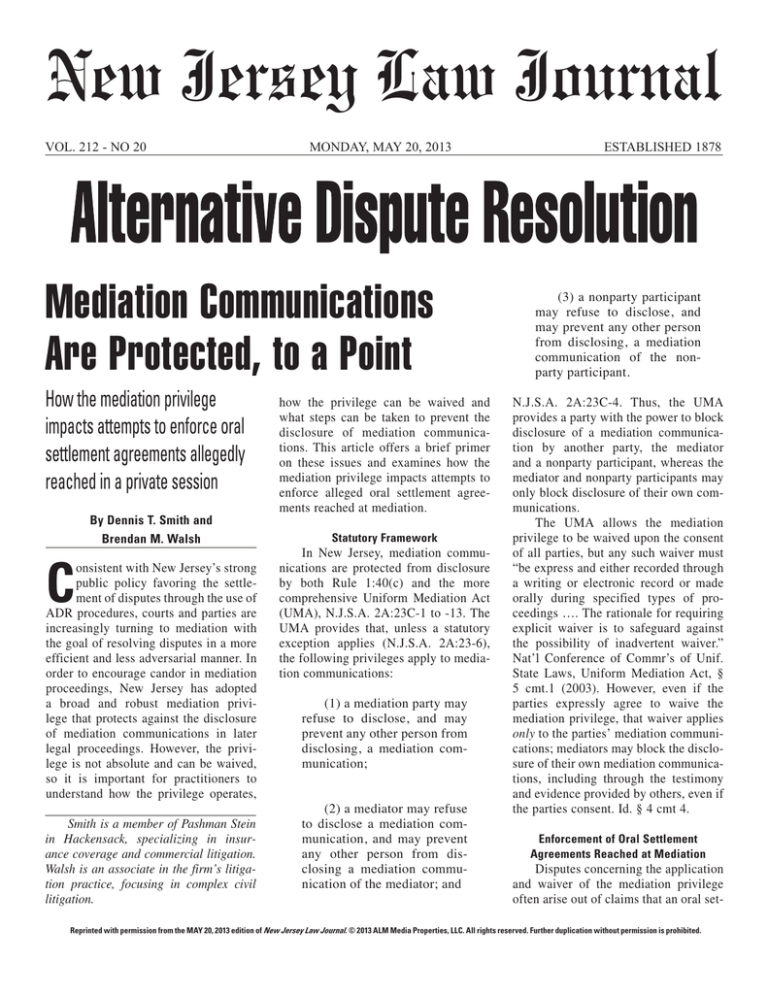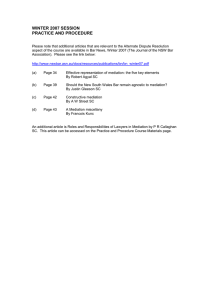
New Jersey Law Journal
VOL. 212 - NO 20
MONDAY, MAY 20, 2013
ESTABLISHED 1878
Alternative Dispute Resolution
Mediation Communications
Are Protected, to a Point
How the mediation privilege
impacts attempts to enforce oral
settlement agreements allegedly
reached in a private session
By Dennis T. Smith and
Brendan M. Walsh
C
onsistent with New Jersey’s strong
public policy favoring the settlement of disputes through the use of
ADR procedures, courts and parties are
increasingly turning to mediation with
the goal of resolving disputes in a more
efficient and less adversarial manner. In
order to encourage candor in mediation
proceedings, New Jersey has adopted
a broad and robust mediation privilege that protects against the disclosure
of mediation communications in later
legal proceedings. However, the privilege is not absolute and can be waived,
so it is important for practitioners to
understand how the privilege operates,
Smith is a member of Pashman Stein
in Hackensack, specializing in insurance coverage and commercial litigation.
Walsh is an associate in the firm’s litigation practice, focusing in complex civil
litigation.
how the privilege can be waived and
what steps can be taken to prevent the
disclosure of mediation communications. This article offers a brief primer
on these issues and examines how the
mediation privilege impacts attempts to
enforce alleged oral settlement agreements reached at mediation.
Statutory Framework
In New Jersey, mediation communications are protected from disclosure
by both Rule 1:40(c) and the more
comprehensive Uniform Mediation Act
(UMA), N.J.S.A. 2A:23C-1 to -13. The
UMA provides that, unless a statutory
exception applies (N.J.S.A. 2A:23-6),
the following privileges apply to mediation communications:
(1) a mediation party may
refuse to disclose, and may
prevent any other person from
disclosing, a mediation communication;
(2) a mediator may refuse
to disclose a mediation communication, and may prevent
any other person from disclosing a mediation communication of the mediator; and
(3) a nonparty participant
may refuse to disclose, and
may prevent any other person
from disclosing, a mediation
communication of the nonparty participant.
N.J.S.A. 2A:23C-4. Thus, the UMA
provides a party with the power to block
disclosure of a mediation communication by another party, the mediator
and a nonparty participant, whereas the
mediator and nonparty participants may
only block disclosure of their own communications.
The UMA allows the mediation
privilege to be waived upon the consent
of all parties, but any such waiver must
“be express and either recorded through
a writing or electronic record or made
orally during specified types of proceedings …. The rationale for requiring
explicit waiver is to safeguard against
the possibility of inadvertent waiver.”
Nat’l Conference of Commr’s of Unif.
State Laws, Uniform Mediation Act, §
5 cmt.1 (2003). However, even if the
parties expressly agree to waive the
mediation privilege, that waiver applies
only to the parties’ mediation communications; mediators may block the disclosure of their own mediation communications, including through the testimony
and evidence provided by others, even if
the parties consent. Id. § 4 cmt 4.
Enforcement of Oral Settlement
Agreements Reached at Mediation
Disputes concerning the application
and waiver of the mediation privilege
often arise out of claims that an oral set-
Reprinted with permission from the MAY 20, 2013 edition of New Jersey Law Journal. © 2013 ALM Media Properties, LLC. All rights reserved. Further duplication without permission is prohibited.
212 N.J.L.J. 431
NEW JERSEY LAW JOURNAL, MAY 20, 2013
tlement agreement was reached at mediation. Although New Jersey courts tend to
strictly construe the mediation privilege,
out of a recognition that “[t]he issue of
confidentiality of mediation proceedings
is a matter of great public and systemic
importance,” Lehr v. Afflitto, 382 N.J.
Super. 376, 391 (App. Div. 2006), two
recent Appellate Division cases indicate
that the state’s public policy in favor
of enforcing settlement agreements may
be stronger than its policy favoring the
confidentiality of mediation proceedings.
In Willingboro Mall v. 240/242
Franklin Ave, 421 N.J. Super. 445 (App.
Div. 2011), cert. granted, 209 N.J. 97
(2012), the defendant claimed that the
parties reached an oral settlement agreement at mediation and moved to enforce
the agreement after the plaintiff refused
to consummate it. Although the parties
had not yet expressly waived the mediation privilege, the defendants submitted
certifications of both counsel and the
mediator in support of their motion to
enforce the alleged oral agreement. But
rather than object to what appears to
have been a plain breach of the mediation privilege by both defense counsel
and the mediator, the plaintiff argued
that the alleged oral agreement was unenforceable as a result of Rule 1:40-4(i)’s
requirement that settlement agreements
reached at a mediation be “reduced to
writing.” The plaintiff further argued
that it was entitled to discovery from the
mediator to support its claim that any
settlement agreement was unenforceable
because it was achieved through coercion
and deceit.
Thereafter, the mediator was
deposed and separately examined during
the course of a four-day hearing concerning the enforceability of the alleged
oral agreement. The trial court enforced
the oral settlement agreement, and the
Appellate Division affirmed, holding that
while the mediation privilege will typically “present obstacles to enforcement
of an oral agreement reached through
mediation when the parties do not waive
the confidentiality conferred on the proceeding,” that was not the case before it.
The panel concluded that with the plaintiff “having waived the confidentiality
normally afforded to such proceedings,
the [trial court properly] proceeded in the
normal course to determine whether the
parties had reached a settlement.”
The Appellate Division also
addressed the issue of waiver of the
mediation privilege in the context of
an alleged oral settlement agreement in
Rutigliano v. Rutigliano, No. A-279711T1, 2012 N.J. Super. LEXIS 2319
(App. Div. Oct. 15, 2012). There, the trial
court directed the parties to participate
in nonbinding mediation, after which the
mediator advised the court that a settlement had been reached. As a result, the
trial court marked the case as closed.
However, at or about that same time,
plaintiff’s counsel sent a letter to defendant’s counsel stating that the plaintiff
did not believe that a final settlement
agreement had been reached at the mediation. The defendant moved to enforce
the alleged oral settlement agreement
and, in response, the plaintiff argued both
that “the parties had never entered into a
written settlement agreement and neither
party should be able to present testimony
concerning what happened during the
mediation session.”
While the court declined to hear
testimony from counsel or the mediator,
the trial court ruled that the parties could
offer limited testimony “concerning what
took place when the terms of the settlement were discussed and finalized at the
conclusion of the mediation.” The defendant testified, but the plaintiff refused,
stating that “if he did so, this might
be construed as a waiver of his right
to maintain the confidentiality of what
occurred during the mediation.” The
trial court enforced the oral settlement
agreement, and the Appellate Division
affirmed, concluding that:
[B]oth parties waived the
mediation privilege prior to
the plenary hearing when they
each consented to permit the
mediator to notify the court the
case had been settled. Because
each disclosed there was a settlement, there was no bar to either party disclosing the terms
of that settlement or, if neces-
2
sary, going to court to enforce
that settlement.
Although the Appellate Division’s
opinion in Rutigliano is unpublished, and
thus not precedential, the court’s finding
that the privilege can be waived merely
by advising the court that the mediation
resulted in a settlement agreement should
give counsel great pause.
Lessons Learned
What lessons can be learned from
the Appellate Division’s decisions in
Willingboro and Rutigliano? First, when
faced with a motion to enforce an alleged
oral settlement agreement reached during the course of a mediation, counsel should immediately argue that it
would be impossible for the trial court
to resolve any factual disputes regarding
whether the parties actually reached an
agreement or the terms of the alleged
agreement without violating the mediation privilege.
Second, if the court rejects such an
argument, counsel should fully participate in any evidentiary hearings and avail
themselves of the opportunity to present
evidence to the court after making clear
that, by so participating, they do not
intend to waive any argument that the
mediation privilege prohibits the court
from allowing the disclosure of such
information.
Third, prior to participating in a
mediation session, counsel should insist
on an agreement among all participants
that: (a) there will be no binding settlement agreement until such an agreement
is reduced to a signed writing; (b) a settlement agreement may only be reported
to the court following the execution of a
signed written agreement; and (c) all participants must be given advance notice
of another participant’s intention to disclose mediation communications, so as
to allow the other participants sufficient
time to object to any such disclosure.
The Supreme Court of New Jersey
may soon provide additional clarity on
the issue of the enforceability of oral settlement agreements arising from mediation. The court granted certification in
Willingboro and heard argument on Feb.
3
NEW JERSEY LAW JOURNAL, MAY 20, 2013
27. The appellants asked, among other
things, that the court adopt a rule that
such oral settlement agreements are per
se unenforceable given Rule 1:40-4(i)’s
requirement that settlement agreements
reached in a mediation “be reduced to
writing.” But comments by the justices
suggest they may be unwilling to adopt
such a bright-line rule. However, regardless of how the court rules, following
212 N.J.L.J. 431
the steps set forth above is not overly
cumbersome and will provide additional
protection against a claim of an alleged
oral settlement agreement arising out of
a mediation. ■


